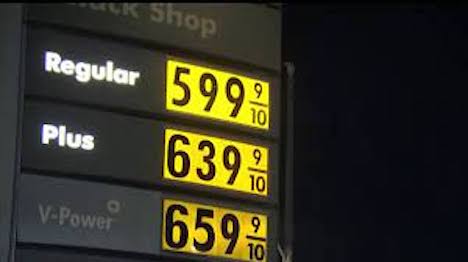
White House aides are reviewing how the U.S. could respond if Russia curtails exporting global oil products due to hostilities over Ukraine, anticipating a potential spike in gas prices that could further compound already high prices domestically.
Moves being discussed by administration officials include another potential release of the American government’s strategic oil reserves, said two people with knowledge of the matter, who spoke on the condition of anonymity to discuss internal deliberations.
The administration’s contingency planning reflects the mounting alarm globally over the state of affairs between the U.S. and Russia. Russian President Vladimir Putin on Monday formally recognized the independence of two regions in eastern Ukraine, and the White House quickly retaliated by announcing new sanction measures.
If the U.S. imposes broader sanctions on Russia over a military incursion in Ukraine, Russia could strike back by limiting sales of oil and other energy products to Europe and other parts of the world.
Russia currently produces roughly 11% of the world’s oil supply, or roughly 10.5 million barrels per day, according to the U.S. Energy Information Administration.
The conversations weighing a release of American oil reserves were described as preliminary as the administration considers a broader set of options to insulate Americans from higher gas prices, the people said, both with or without a conflict in Eastern Europe.
White House officials have also recently expressed openness to a holiday from the national gas tax. White House spokeswoman Emilie Simons said in a statement last week that “all options are on the table.”
The U.S. currently has roughly 585 million barrels in reserve, and imports roughly 6 million barrels a day, according to Patrick De Haan, an industry analyst at GasBuddy. If released in full, the U.S. reserves could meet America’s typical import consumption of crude oil for about 97 days, he said.
President Joe Biden announced a separate release of 50 million barrels of oil last fall from the Strategic Petroleum Reserve in response to high gas prices related to the global economy’s uneven rebound from the pandemic.
“If Russia responds to sanctions by curbing their oil exports, that’s what the Strategic Petroleum Reserve was built for,” De Haan said. “The U.S. SPR stands ready for its intended purpose – to offer the nation security if there is a disruption.”
The administration is “prepared, if necessary, to deploy all tools and authorities at our disposal” to bring down prices at the gas pump, the White House said in a statement, which added that millions of barrels tied to the administration’s fall announcement are rolling onto the market and helped gasoline fall by more than 10 cents a gallon during the holiday season.
Vice President Kamala Harris told reporters on Sunday that administration officials were looking closely at what could be done, if necessary, to prevent price hikes at the pump from hurting American consumers. CNN also previously reported that the U.S. State Department has been putting together a global strategy with companies across the world regarding increasing production of natural gas that can be provided to Europe.
“Maybe we will incur some cost – and in this situation that may relate to energy costs, for example,” Harris said. “But we are taking very specific and appropriate I believe steps to mitigate what that cost, if it happens.”
Most industry experts say that it is still appears unlikely that Russia would curb its exports. Doing so would deprive Russia of a major source of revenue, while also hurting Russia’s standing among the expanded alliance of Organization of the Petroleum Exporting Countries (OPEC) of which it is a leading member, according to Jason Bordoff, a Columbia University energy expert and founding director of the Center on Global Energy Policy.
“We’ve never seen Russia cut off oil exports – it’s a blunt instrument that would hurt not just the U.S. but also China and other allies,” Bordoff said. “They certainly have that tool at their disposal in retaliation for sanctions – it’s a possibility I can’t dismiss, but those are some of the reasons they might not do it.”
The administration is likely acutely sensitive to the impact of high gas prices on consumers, given that voters are already widely frustrated with inflation. High oil prices have proven one of the most persistent and damaging political head winds for the Biden administration as part of a broader inflationary spike coming out of the covid pandemic. The average price for a gallon of gas hit $3.53 on Monday, a slight increase from $3.33 a month ago and a big increase from $2.63 last year, according to AAA.
The White House has few obvious answers – outside deploying the nation’s limited reserves – should Russia constrict its supply, analysts say.
The administration could ask Saudi Arabia or Iran to bolster its spare capacity for production, But such a move that may require other international concessions the administration may be reluctant to make, and it is unclear how quickly those countries could move.
A Russian cessation of exports would also fall particularly hard on Europe, which receives the bulk of Russian pipeline exports of natural gas. The U.S. government would likely try to encourage private firms to export more liquefied natural gas – which can be transported by vessel – to Europe, but those efforts would be unlikely to fill the hole left by a major Russian drawdown. The result will be higher prices for European consumers at a time when many European political leaders have already faced substantial blowback over heating costs.
“You can do certain things to help soften the blow in the short-run, and those actions – including SPR – are potentially important steps to take,” said Jonathan Elkind, a senior research scholar at the Center on Global Energy Policy at Columbia University. “But they wont address fully and they wont address in more than the short-run how the markets look.”
(c) 2022, The Washington Post · Jeff Stein
{Matzav.com}